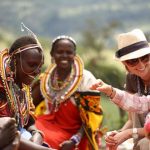
Rwanda is among the famous tourist destinations in Africa and popularly known for the best gorilla trekking experience in the Magnificent Volcanoes National Park. The fact that Rwanda has three National Parks (Volcanoes N.P, Nyungwe N.P & Akager national Park) makes it a potential destination for tourists.
Rwanda tourism sector lean on primate trekking: Mountain Gorillas, chimpanzees, colobus monkeys, Golden monkeys among others. The beautiful relief which is made up of majestic Mountains shouldn’t also be underestimated! However, it’s unfortunate that Rwanda’s tourism sector is facing the following limitations/ challenges:
High population growth, the high growing population of Rwanda is a liability to the tourism sector. The high population has put much pressure on natural resources like forest, swamps, relief and drainage features. It is estimated that Rwanda population density is close to 300 people per Km2. The high population means, people need to partake in the resources in the country’s game parks, especially land for agriculture and wood and water resources.
The second challenge is the need to clearly show the link between conservation and economic development. Most people never appreciate the benefits of tourism resources, and do not see any reason conserve these resources and yet tourism remains a key source of revenue for Rwanda.
The Insufficient human capacity –there is a need to train more people to take charge of Game parks and their conservation role.
Limited funds- Currently, Rwanda National parks have not yet reached a level of financing them selves. The government has to inject in more fund to fulfill the annual budgets to run the industry.
The challenge is to ensure that the country never depletes its tourism resources by failure to promote sustainable tourism / Eco-tourism. The task of protecting the wildlife and their habitat is hard because poaching is still rampant in Rwanda on addition to encroachments of people to the reserves due to high population growth rates.
All in all, the Rwandan government through its bodies of conservation such as Rwanda Development Board (RDB) should put efforts to sensitize the public / local communities around national parks about the values of tourism in their area.
The local communities should be trained and employed in different tourism sectors such as hotels to work as waiters, cleaners, chef, etc, in parks to work as rangers, warden or porters. This will help reduce the number of poachers.



